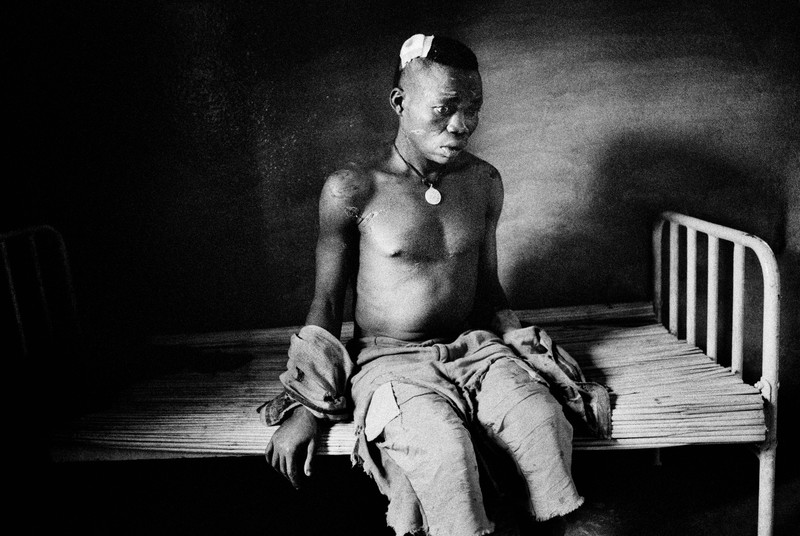Shifting Sands: Conflict Photojournalism and Ethics

Aperture Conversations
Shifting Sands: Conflict Photojournalism and Ethics
Tuesday, September 18
6:30 p.m. EDT
What are the ethical responsibilities of photojournalists who choose to cover conflict? Can they be truly neutral or does one have a responsibility to reflect the moral and political imbalances of a given situation? This panel will explore the ethical pressures on photojournalists in conflict and will consider their accountability for the positions they take; the pictures they make and how they make them; where they place their images; and the voice they attach to them. The discussion will consider the responsibilities and consequences, intended and otherwise, of reporting on conflict. Moderated by Stephen Mayes, the panel will include Marcus Bleasdale, Jason Cone, Philip Gourevitch, Thomas Keenan, and Kira Pollack.
This event will be live streamed. Click here to watch live at 6:30 pm EST.
Presented in partnership with VII Photo Agency.
Marcus Bleasdale’s work has been honored by Photo District News (PDN) as among the most iconic photography of the twenty-first century. His coverage of ten years of conflict in the Democratic Republic of the Congo (DRC) has been published in two books, One Hundred Years of Darkness (2002), which was recognized as one of the best photojournalism books of the year by PDN, and Rape of a Nation (2010). In 2007, Human Rights Watch and the Open Society Institute awarded Bleasdale a grant to continue his work on justice and accountability in the DRC. He is widely published in the United Kingdom, Europe, and the United States in publications such as the Sunday Times Magazine, the Telegraph Magazine, Geo, Stern, the New Yorker, TIME, Newsweek, and National Geographic Magazine.
Philip Gourevitch is a longtime staff writer for the New Yorker, a former editor of the Paris Review, and the author of three books: The Ballad of Abu Ghraib [Standard Operating Procedure] (2008), A Cold Case (2001), and We Wish to Inform You That Tomorrow We Will Be Killed with Our Families: Stories from Rwanda (1998), which won the National Book Critics Circle Award, the Los Angeles Times Book Award, the George K. Polk Book Award, the PEN/Martha Albrand Award for First Nonfiction, the New York Public Library Helen Bernstein Award and, in England, the Guardian First Book Award. His books have been translated into more than a dozen languages, and his reportage, essays, criticism, and short fiction have appeared in numerous publications at home and abroad. In 2010, he was named a Guggenheim Fellow and a Chevallier de l’Ordre des Arts et Des Lettres in France. In 2011, We Wish to Inform You… was included in the Guardian’s list of the hundred greatest non-fiction books from the past two thousand five hundred years.
Jason Cone is the communications director for Doctors Without Borders/Mèdecins Sans Frontiéres (MSF) in the United States. In this capacity, he has overseen crisis and advocacy communications campaigns for MSF, ranging from the Haiti earthquake and cholera epidemic to global childhood malnutrition to HIV/AIDS. During his tenure, Harris Interactive, a polling firm, has ranked MSF as the most trusted non-profit in the United States. As executive producer of the Starved for Attention, the MSF-VII Photo, Emmy-nominated documentary series on childhood malnutrition, Cone oversaw the production of eight documentary films, social media strategy, exhibits, and public actions in over a dozen countries aimed at pushing the world’s top donor countries to improve the quality of food aid for malnourished children. He has been a speaker on the importance and ethical dilemmas of utilizing visual communications and social media to advance humanitarian action at the Harvard Humanitarian Initiative, NYU’s Institute for Public Knowledge, PhotoPlus, and Social Media Week. Cone was a curator of the photographic exhibits Doctors Without Borders: Photographs from Afghanistan (1984-2004), and The Photographer: Into War-torn Afghanistan with Doctors Without Borders.
Thomas Keenan teaches literary theory and human rights at Bard College, where he directs the Human Rights Project. He is the author of Fables of Responsibility (1997) and coeditor, with Wendy Chun, of New Media, Old Media: A History and Theory Reader (2005). He recently published, with Eyal Weizman, Mengele’s Skull (2012). The exhibition Antiphotojournalism, which he curated with Carles Guerra, was on display at La Virreina in Barcelona and FOAM in Amsterdam in 2010–11; he also curated Aid and Abet, a project featuring photographers from VII Photo Agency, for the Zoom Festival in Quebec in 2011.
Stephen Mayes is director of VII Photo in New York and has been secretary to the jury of the World Press Photo competition since 2004. A leader in the field for twenty-five years, he has worked in the areas of art, commercial, and fashion photography and photojournalism. He has been manager of Network Photographers and has served as Chair of World Press Photo competition. He was senior vice president at Getty Images, where he led the Creative Department in developing commercial content strategies, and held the same title at eyestorm.com, where he represented high-end artists in the consumer marketplace. Mayes also worked with Art + Commerce as director of its Image Archive, where he represented top fashion and art photographers for commercial licensing. He writes and broadcasts regularly on the ethics and realities of photographic practice.
Kira Pollack is the director of photography at TIME magazine, where she oversees the photographic vision of TIME, TIME.com, and all digital media. In October 2011, she was named the photo editor of the year at the Lucie Awards. Since Pollack joined TIME in October 2009, the brand’s photography has been recognized with many prestigious awards, including the World Press Photo of the Year and the Visa D’Or award at Visa Pour l’Image. In March 2011, she established TIME’s photography site LightBox, which is dedicated to the culture of images and provides a forum for conversation on photography. Pollack also spearheaded TIME’s Beyond 9/11 project, which included forty portraits coupled with oral histories, a special commemorative issue, a microsite, a documentary in association with HBO, and a gallery exhibition. Previously, Pollack was the deputy photo editor for the New York Times Magazine. During her eleven-year tenure, she produced the annual Oscars portfolio from 2004–2009 and Obama’s People in 2009 under Kathy Ryan. She was also the photo editor of Play, the Times’ sports magazine. Prior to the New York Times Magazine, Pollack was an associate photo editor at the New Yorker from 2004–2008.
Image: Democratic Republic of the Congo, 2003 © Marcus Bleasdale/VII











